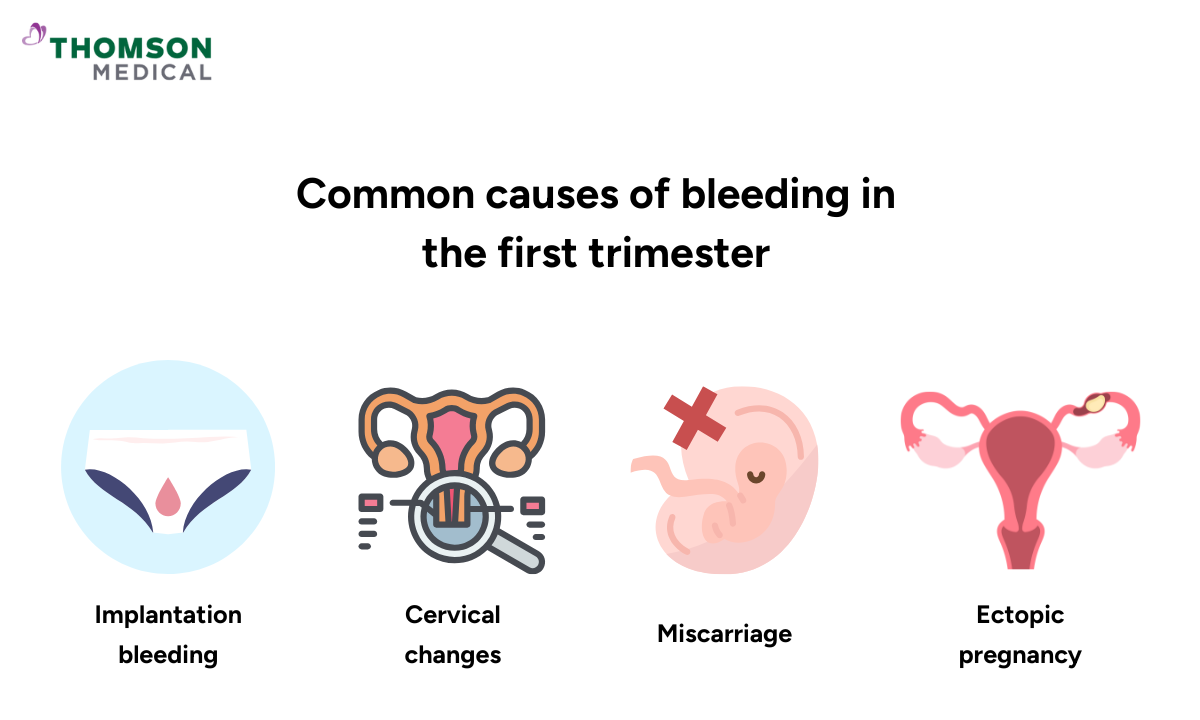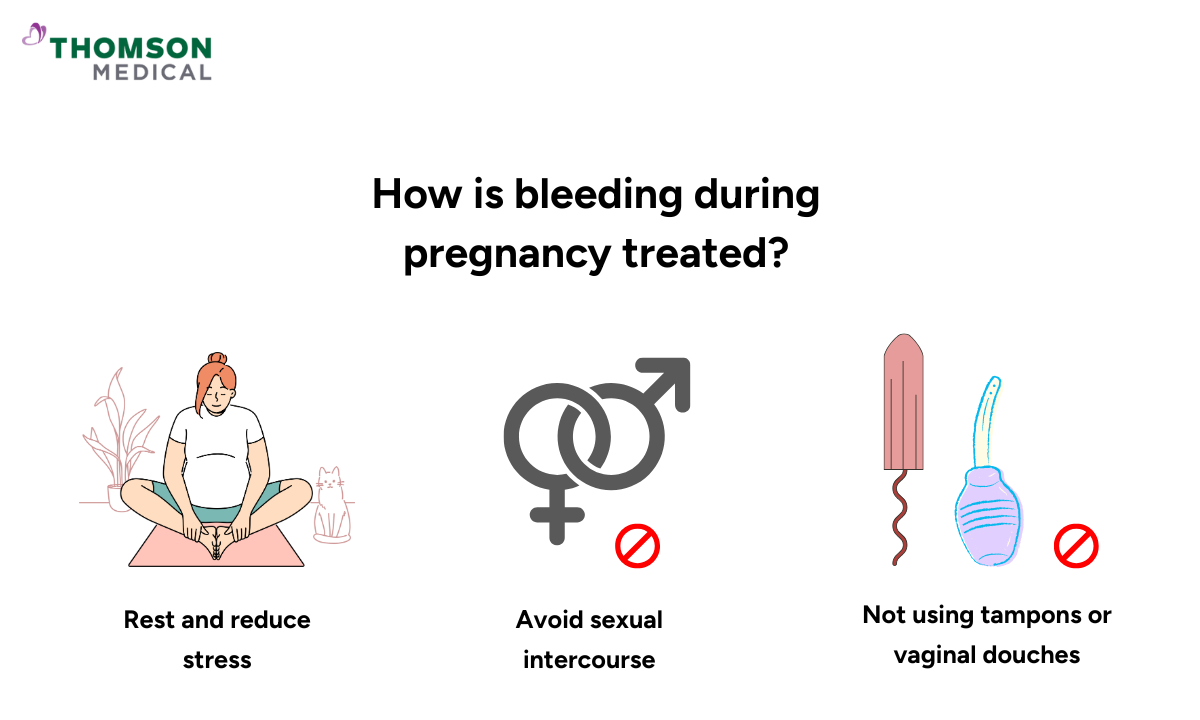Finding out you are pregnant is often filled with excitement and hope, so noticing bleeding in those first few weeks can feel frightening. While bleeding in the first trimester is fairly common and not always a sign of trouble, it is something that should never be ignored. Sometimes it’s simply your body adjusting, like light spotting from implantation or changes in the cervix. Other times, it may be a sign that something needs attention, such as a miscarriage or an ectopic pregnancy. Knowing the possible reasons behind early pregnancy bleeding can help you feel more reassured and guide you on when it’s important to reach out to your doctor.
Why am I bleeding during early pregnancy?
Experiencing bleeding in early pregnancy can feel worrying, but it is actually quite common, especially in the first trimester. Not all bleeding means something is wrong, and in many cases, light spotting or mild vaginal bleeding is part of the normal changes your body goes through. Even so, it’s a good idea to let your healthcare provider know about any bleeding you notice during pregnancy so they can reassure you and make sure everything is progressing safely.
There are several reasons why bleeding might happen in early pregnancy. Sometimes it can be due to implantation bleeding, which occurs when the fertilised egg attaches to the lining of the womb. Cervical changes and hormonal shifts can also lead to light spotting. On the other hand, bleeding can occasionally signal something more serious, such as a miscarriage or an ectopic pregnancy, where the pregnancy develops outside the womb.
What are the most common causes of bleeding in the first trimester?

Bleeding in early pregnancy can happen for many different reasons. While some causes are harmless, others may need medical attention. Therefore, understanding the possible reasons can help you know what to expect and when to seek advice from your doctor.
Implantation bleeding
One of the earliest and most common causes of light bleeding is implantation bleeding. This happens when the fertilised egg attaches to the lining of the womb, usually around 10 to 14 days after conception. The process can disrupt tiny blood vessels, leading to light spotting. It often looks pink or brown, is much lighter than a period, and may last only a few hours to a couple of days. Some women may also notice mild cramping. Implantation bleeding is usually not a cause for concern and can be one of the first signs of pregnancy.
Cervical changes
During pregnancy, rising levels of hormones such as oestrogen and progesterone can make the cervix more sensitive. This is sometimes called cervical ectropion. As a result, light spotting may occur after sexual intercourse or even following a routine examination. While this can be alarming, it is generally harmless.
Miscarriage
Unfortunately, bleeding can also signal an early pregnancy loss, more commonly known as a miscarriage. This happens in about 1 in 10 pregnancies, most often because the embryo does not develop as expected due to chromosomal differences. A miscarriage usually causes vaginal bleeding that may be heavier than spotting, often with abdominal or pelvic pain, and sometimes the passing of tissue.
Ectopic pregnancy
In some cases, bleeding may be linked to an ectopic pregnancy, where the fertilised egg implants outside the womb, usually in a fallopian tube. This condition is rare but serious and can be life-threatening if not treated quickly. Signs may include vaginal bleeding, abdominal or pelvic pain, dizziness, or fainting. Because the fallopian tube cannot stretch like the uterus, it can rupture as the pregnancy grows, leading to dangerous internal bleeding. An ectopic pregnancy is a medical emergency and requires immediate treatment.
How much bleeding is normal in early pregnancy?
Noticing bleeding in early pregnancy can be unsettling, but light spotting or a small amount of bleeding is often considered normal. Spotting during pregnancy usually appears as just a few drops of blood, while light bleeding may be enough to notice on a pantyliner but should not soak a pad. These changes are often linked to harmless causes such as implantation bleeding, when the fertilised egg attaches to the womb lining, or cervical changes brought on by pregnancy hormones.
Even so, every pregnancy is unique. While light spotting may be nothing to worry about, it’s always a good idea to let your doctor know if you notice any vaginal bleeding so that they can rule out complications and reassure you.
Can you bleed in early pregnancy without having a miscarriage?
Yes, bleeding in early pregnancy does not always mean you are having a miscarriage. Many women experience spotting or light bleeding and still go on to have healthy pregnancies. Common causes include implantation bleeding, hormonal changes, or a more sensitive cervix that may bleed after intercourse or an examination.
There are, however, other conditions such as ectopic pregnancy, subchorionic haematoma, or molar pregnancy that can also cause bleeding, though these are less common. Because it is not always possible to tell the difference on your own, speaking with your healthcare provider is the safest way to understand what is happening.
Is period-like bleeding during pregnancy normal?
Unlike light spotting, heavier bleeding that looks or feels like a menstrual period should never be overlooked. A flow similar to menstruation may be a sign of miscarriage or ectopic pregnancy, both of which need medical attention. In some cases, it might still be due to less serious changes such as implantation or cervical sensitivity, but it’s always better to err on the side of caution.
If you notice bleeding that is heavier than spotting, or if it comes with symptoms like cramping, abdominal pain, dizziness, or fever, seek medical advice straight away. Getting checked promptly helps protect both your health and your pregnancy.
Signs that bleeding might not be normal and when to seek advice
While light spotting in early pregnancy can be harmless, there are times when bleeding may point to something more serious. It’s important to know the warning signs so you can seek medical advice quickly if needed.
You should contact your doctor or go to the nearest emergency department if you notice:
Heavy vaginal bleeding that soaks through pads in a short period of time
Passing clots or tissue
Bleeding with strong cramps or pelvic pain
Bleeding with dizziness, fainting, or weakness
Bleeding that continues for several hours or days
Bleeding with fever or vaginal discharge that has an unpleasant smell
Any vaginal bleeding in pregnancy should be discussed with your healthcare provider, even if it seems light, so they can check that everything is progressing safely.
If you’re worried about bleeding during pregnancy or have noticed any of the symptoms above, you can request an appointment with Thomson Medical to discuss your concerns with our specialists.
How is bleeding during pregnancy treated?

The treatment for bleeding in early pregnancy depends on what is causing it and how severe it is. In many cases, light spotting is not a reason for concern and may not need any treatment at all. Therefore, it’s always best to let your doctor know so they can guide you on the right steps.
General care measures
If you are experiencing light bleeding or spotting, your doctor may advise:
Getting plenty of rest and reducing stress
Avoiding sexual intercourse until the bleeding stops
Not using tampons or vaginal douches
If the bleeding is heavier, lasts longer, or is accompanied by pain, you should seek medical attention straight away.
Treatment based on the cause
Implantation bleeding:
This is harmless and usually does not require any treatment.
Miscarriage:
The treatment depends on the type of miscarriage. Some resolve naturally with careful monitoring, while others may require medication or a procedure to remove pregnancy tissue.
Ectopic pregnancy:
This is a medical emergency and needs prompt treatment, which may involve medication or surgery.
Infections:
These are treated with antibiotics or other medicines, depending on the cause.
Our O&G specialists
Loading...
FAQ
What to do if you have abnormal bleeding during pregnancy?
If you notice bleeding that feels unusual, whether it’s heavy, lasts for several hours, or comes with pain, dizziness, or fever, it’s important to contact your doctor straight away. While some bleeding in early pregnancy can be harmless, only a healthcare professional can check the cause and make sure you and your baby are safe.
Can you have a healthy pregnancy after early bleeding?
Yes, many women go on to have completely healthy pregnancies even after experiencing bleeding in the early weeks. Light spotting or mild bleeding does not always mean something is wrong, and in many cases, it can be linked to harmless causes such as implantation or hormonal changes. That said, it’s always important to speak with your healthcare professional if you experience bleeding in early pregnancy. Getting checked helps to rule out complications and ensures you receive the right care and reassurance throughout your pregnancy journey.
Is implantation bleeding the same as a period?
No, implantation bleeding is different from a period. It is usually very light, pink or brown in colour, and lasts only a day or two. Unlike a period, it does not soak through a pad and may come with mild cramps or early pregnancy symptoms such as morning sickness, fatigue or sore breasts.
Will an ultrasound show the cause of bleeding?
Yes, an ultrasound scan is often one of the first tests used to investigate bleeding during pregnancy. It allows doctors to see the uterus, cervix, ovaries, and developing pregnancy to check for possible causes such as miscarriage, ectopic pregnancy, fibroids, or polyps. However, an ultrasound may not always identify the exact reason for bleeding. In some cases, further tests such as a biopsy or hysteroscopy may be needed for a complete diagnosis.
Can stress or exercise cause bleeding in early pregnancy?
Stress or exercise does not usually cause bleeding in early pregnancy. However, vigorous activity or sexual intercourse can sometimes trigger light spotting because pregnancy hormones make the cervix more sensitive and increase blood flow to the area.
What does brown discharge mean during pregnancy?
Brown discharge in pregnancy is often normal and usually means old blood leaving the body. Common harmless causes include implantation bleeding, hormonal changes affecting the cervix, or the release of the mucus plug later in pregnancy. However, brown discharge can sometimes point to more serious issues, such as miscarriage, ectopic pregnancy, infection, subchorionic haematoma, or problems with the placenta. If you notice brown discharge and feel concerned, it’s best to check with your healthcare provider for reassurance and care.
How do I know if it's a miscarriage or just bleeding?
It is not always easy to tell the difference between normal early pregnancy bleeding and a miscarriage. Light spotting on its own is often harmless and can be caused by implantation or changes to the cervix. A miscarriage, on the other hand, is more likely if the bleeding becomes heavier, similar to a period, and is accompanied by strong cramps, the passing of clots or tissue, persistent lower back pain, or feelings of dizziness and faintness. Because the symptoms can overlap, the only way to know for sure is to seek medical advice. Your doctor may recommend tests or an ultrasound to check what is happening and to ensure you receive the right care.
The information provided is intended for general guidance only and should not be considered medical advice. For personalised recommendations and tailored advice, please consult a specialist at Thomson Medical. Request an appointment with Thomson Medical today.
For more information, contact us:
Thomson Specialists (Women's Health)
Thomson Women's Clinic (TWC)
- Novena:
6592 6686 (Call), 8611 8986 (WA) - Bukit Batok:
6569 0668 (Call), 8686 3525 (WA) - Choa Chu Kang:
6893 1227 (Call), 8282 1796 (WA) Jurong:
6262 8588 (Call), 6262 8588 (WA)- Katong (female doctor):
6970 2272 (Call), 8611 9020 (WA) - Punggol:
6243 6843 (Call), 8811 0328 (WA) - Sembawang: 6753 5228
- Sengkang: 6388 8125
- Serangoon (female doctor): 6382 3313
- Tampines: 6857 6266
- Tiong Bahru: 6276 1525
